

Rewiring the Brain to Treat OCD. Dr.
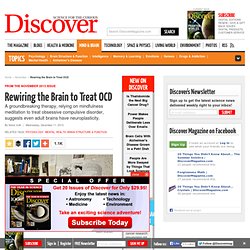
Jeffrey Schwartz got a phone call at 3 p.m., a script before 5 p.m. and the next afternoon he was there, sitting with Leonardo DiCaprio, exploring the intricacies of one of the most debilitating mental illnesses in medicine. DiCaprio was tackling the role of Howard Hughes in The Aviator, a part requiring him to arc — as Hughes did — from genius billionaire to shaggy recluse, caught in the grip of obsessive-compulsive disorder. Patricia Kuhl: The linguistic genius of babies. Sheena Iyengar on the art of choosing.
Dan Dennett: Cute, sexy, sweet, funny. How consciousness works – Michael Graziano. Scientific talks can get a little dry, so I try to mix it up.
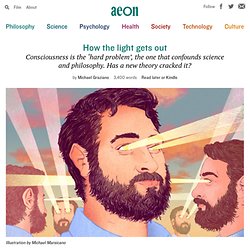
I take out my giant hairy orangutan puppet, do some ventriloquism and quickly become entangled in an argument. I’ll be explaining my theory about how the brain — a biological machine — generates consciousness. Kevin, the orangutan, starts heckling me. ‘Yeah, well, I don’t have a brain. But I’m still conscious. Kevin is the perfect introduction. Many thinkers have approached consciousness from a first-person vantage point, the kind of philosophical perspective according to which other people’s minds seem essentially unknowable. Lately, the problem of consciousness has begun to catch on in neuroscience. I believe that the easy and the hard problems have gotten switched around. In a period of rapid evolutionary expansion called the Cambrian Explosion, animal nervous systems acquired the ability to boost the most urgent incoming signals. Attention requires control. I call this the ‘attention schema theory’. And then what? Manipulating Memory. For psychologist Alain Brunet, the case is still astonishing.
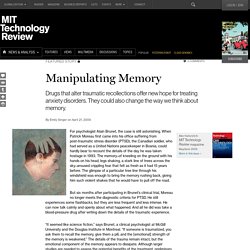
When Patrick Moreau first came into his office suffering from post-traumatic stress disorder (PTSD), the Canadian soldier, who had served as a United Nations peacekeeper in Bosnia, could hardly bear to recount the details of the day he was taken hostage in 1993. Gut feelings: the future of psychiatry may be inside your stomach. Her parents were running out of hope.
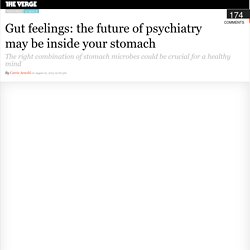
Their teenage daughter, Mary, had been diagnosed with a severe case of obsessive–compulsive disorder (OCD), as well as ADHD. They had dragged her to clinics around the country in an effort to thwart the scary, intrusive thoughts and the repetitive behaviors that Mary felt compelled to perform. Even a litany of psychotropic medications didn’t make much difference. It seemed like nothing could stop the relentless nature of Mary’s disorder. Their last hope for Mary was Boston-area psychiatrist James Greenblatt.
Greenblatt started by posing the usual questions about Mary’s background, her childhood, and the onset of her illness. That’s what prompted Greenblatt to take a surprising approach: besides psychotherapy and medication, Greenblatt also prescribed Mary a twice-daily dose of probiotics, the array of helpful bacteria that lives in our gut. Her parents may have been stunned, but to Greenblatt, Mary’s case was an obvious one. Read next: Amar Toor. The Moth Presents Andrew Solomon: The Refugees. Neuroscientist Daniela Schiller is Researching Ways that Bad Memories Can be Made Less Fearsome. It was a Saturday night at the New York Psychoanalytic Institute, and the second-floor auditorium held an odd mix of gray-haired, cerebral Upper East Side types and young, scruffy downtown grad students in black denim.

Up on the stage, neuroscientist Daniela Schiller, a riveting figure with her long, straight hair and impossibly erect posture, paused briefly from what she was doing to deliver a mini-lecture about memory. She explained how recent research, including her own, has shown that memories are not unchanging physical traces in the brain. Instead, they are malleable constructs that may be rebuilt every time they are recalled. The research suggests, she said, that doctors (and psychotherapists) might be able to use this knowledge to help patients block the fearful emotions they experience when recalling a traumatic event, converting chronic sources of debilitating anxiety into benign trips down memory lane. Fear training.
Daniela Schiller: As good as our last memory by The Story Collider. Blanks for the Memories. The Dark Side of Oxytocin, the Hormone of Love - Ethnocentrism. Yes, you knew there had to be a catch.
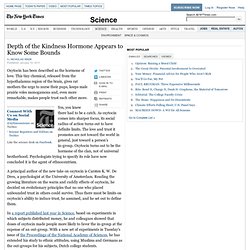
As oxytocin comes into sharper focus, its social radius of action turns out to have definite limits. The love and trust it promotes are not toward the world in general, just toward a person’s in-group. Oxytocin turns out to be the hormone of the clan, not of universal brotherhood. Psychologists trying to specify its role have now concluded it is the agent of ethnocentrism. A principal author of the new take on oxytocin is Carsten K. In a report published last year in Science, based on experiments in which subjects distributed money, he and colleagues showed that doses of oxytocin made people more likely to favor the in-group at the expense of an out-group.
These nationalities were chosen because of a 2005 poll that showed that 51 percent of Dutch citizens held unfavorable opinions about Muslims, and other surveys that Germans, although seen by the Dutch as less threatening, were nevertheless regarded as “aggressive, arrogant and cold.” In Dr. Neurocriminology: Inside the Criminal Mind.